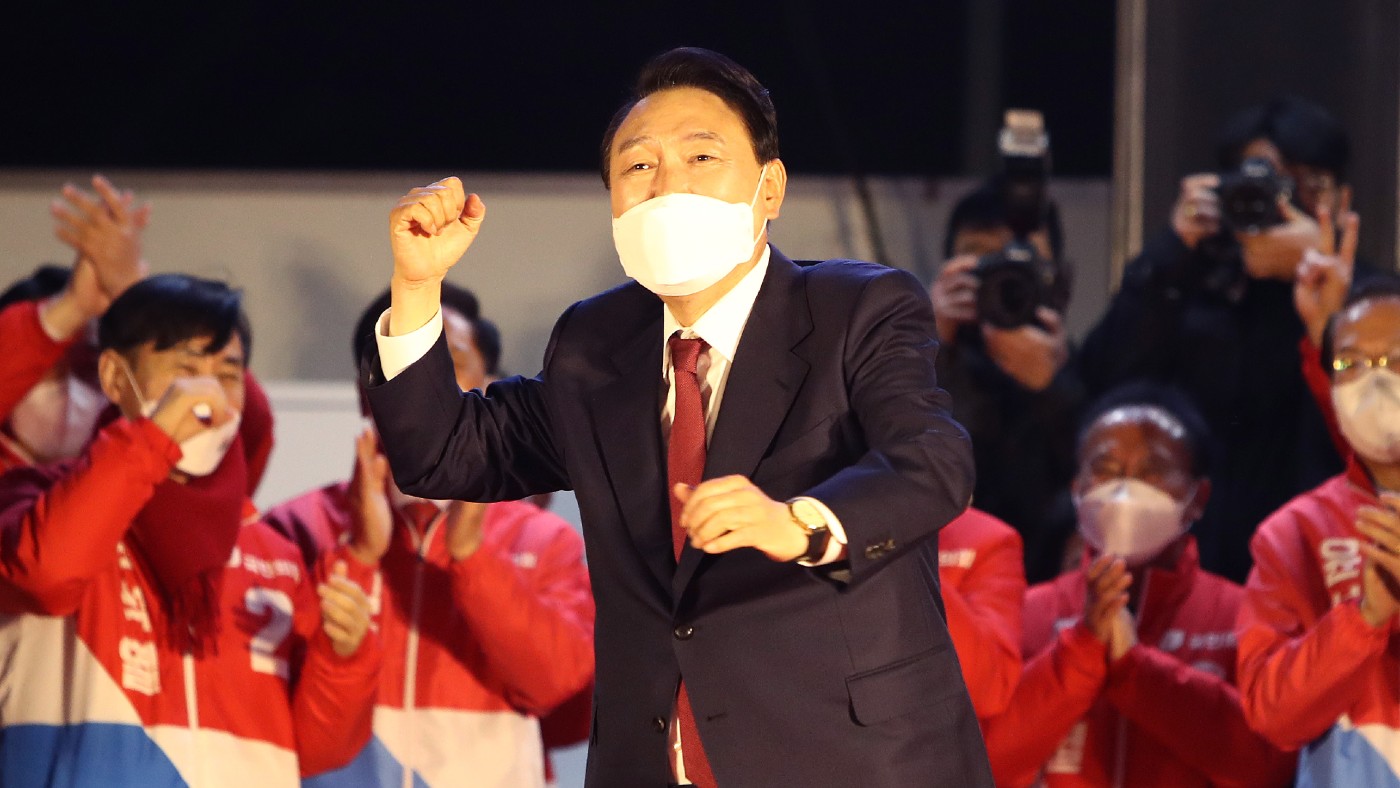A ‘gutter fight’: South Korea’s election plumbs new depths
South Korea’s presidential election didn’t involve sober debate, but campaigns dominated by personalities and mud-slinging

A free daily email with the biggest news stories of the day – and the best features from TheWeek.com
You are now subscribed
Your newsletter sign-up was successful
South Korea’s presidential election was widely seen on social media as “a gutter fight between ‘a thug’ and ‘a fool’”, said Andrew Salmon in the Asia Times (Hong Kong). It wasn’t an unfair description. South Korea faces no shortage of fundamental challenges: a cost of living crisis, a “fast-silvering” population, an unhinged neighbour to the north. But it didn’t get a sober discussion of the issues. Instead, it got a campaign dominated by personalities, and by mud-slinging. In one corner was Lee Jae-myung of the governing left-of-centre Democratic Party of Korea – the “thug”. His campaign began with an apology for a leaked phone recording of a profanity-laden family row; he faced questions over a suspect land development deal and alleged mafia ties. In the other corner was the “fool”, Yoon Suk-yeol of the conservative People Power Party. A former prosecutor new to politics, Yoon often appeared unbriefed. His apparent belief in “odd practices such as anal acupuncture and shamanism” attracted much derision. But when voters went to the polls last week, it was Yoon who triumphed, beating Lee by a margin of 0.73% – the tightest ever in a Korean election.
Yoon, 61, made his name as a prosecutor, said The Korea Herald (Seoul). He oversaw aggressive investigations of power players from both main parties: he had the former conservative president Park Geun-hye impeached and jailed. As the People Power Party’s candidate, he wooed voters with the promise of a presidency defined by anti-corruption, meritocracy and the rule of law. Yoon also relentlessly courted Korea’s “Idaenam”: young conservative men with negative views of feminism, said Ahn Young-chun in Hankyoreh (Seoul). He pledged to close the ministry for gender equality, denied the existence of structural inequality in the face of overwhelming evidence, and blamed feminism for low birth rates.
Yoon’s narrow win shows just how angry and polarised South Korea has become, said Steven Borowiec in Nikkei Asia (Tokyo) – over culture war issues, but also over economics. House prices and living expenses are rocketing. Even the country’s effective management of Covid has been put in doubt by a surge in cases. Yoon won’t find governing easy: his opponents have a supermajority in the legislative assembly after winning a landslide in 2020’s parliamentary elections. That’s why he should strike a conciliatory tone, said Kim Sang-woo in The Korea Times (Seoul). This election was widely viewed as Korea’s “most distasteful” ever. Now, it’s up to Yoon to heal the wounds.
The Week
Escape your echo chamber. Get the facts behind the news, plus analysis from multiple perspectives.

Sign up for The Week's Free Newsletters
From our morning news briefing to a weekly Good News Newsletter, get the best of The Week delivered directly to your inbox.
From our morning news briefing to a weekly Good News Newsletter, get the best of The Week delivered directly to your inbox.
A free daily email with the biggest news stories of the day – and the best features from TheWeek.com
-
 The Olympic timekeepers keeping the Games on track
The Olympic timekeepers keeping the Games on trackUnder the Radar Swiss watchmaking giant Omega has been at the finish line of every Olympic Games for nearly 100 years
-
 Will increasing tensions with Iran boil over into war?
Will increasing tensions with Iran boil over into war?Today’s Big Question President Donald Trump has recently been threatening the country
-
 Corruption: The spy sheikh and the president
Corruption: The spy sheikh and the presidentFeature Trump is at the center of another scandal
-
 Corruption: The spy sheikh and the president
Corruption: The spy sheikh and the presidentFeature Trump is at the center of another scandal
-
 Putin’s shadow war
Putin’s shadow warFeature The Kremlin is waging a campaign of sabotage and subversion against Ukraine’s allies in the West
-
 The fall of the generals: China’s military purge
The fall of the generals: China’s military purgeIn the Spotlight Xi Jinping’s extraordinary removal of senior general proves that no-one is safe from anti-corruption drive that has investigated millions
-
 Epstein files topple law CEO, roil UK government
Epstein files topple law CEO, roil UK governmentSpeed Read Peter Mandelson, Britain’s former ambassador to the US, is caught up in the scandal
-
 Iran and US prepare to meet after skirmishes
Iran and US prepare to meet after skirmishesSpeed Read The incident comes amid heightened tensions in the Middle East
-
 Syria’s Kurds: abandoned by their US ally
Syria’s Kurds: abandoned by their US allyTalking Point Ahmed al-Sharaa’s lightning offensive against Syrian Kurdistan belies his promise to respect the country’s ethnic minorities
-
 Israel retrieves final hostage’s body from Gaza
Israel retrieves final hostage’s body from GazaSpeed Read The 24-year-old police officer was killed during the initial Hamas attack
-
 China’s Xi targets top general in growing purge
China’s Xi targets top general in growing purgeSpeed Read Zhang Youxia is being investigated over ‘grave violations’ of the law